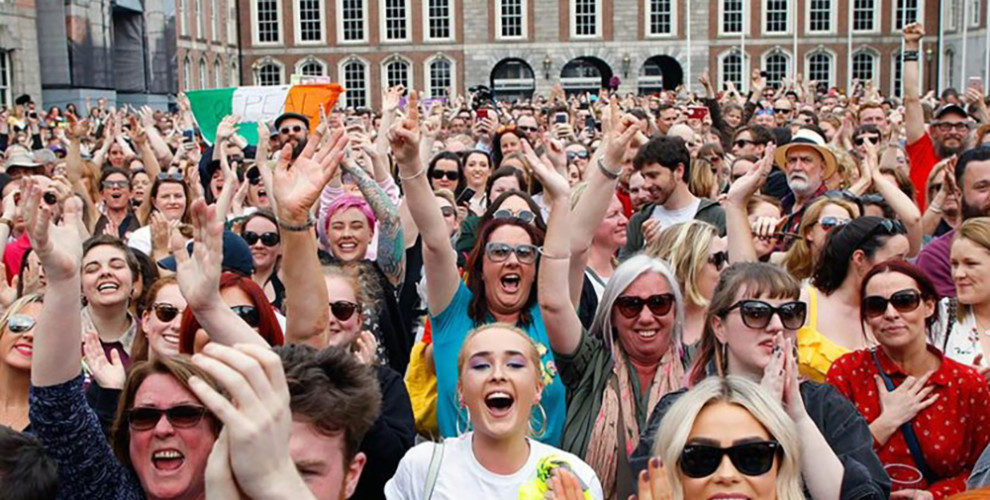Ireland set for referendum on Presidential elections right
Irish Prime Minister announced there will be a referendum to extend right to Irish citizens living in the North of Ireland and abroad to vote for president.
Irish Prime Minister announced there will be a referendum to extend right to Irish citizens living in the North of Ireland and abroad to vote for president.

When Sinn Fein Martin McGuinnes stood in the Irish Presidential election in 2011, he could not vote.
Now, current Taoiseach (Prime Minister), Leo Varadkar, announced that there will be a referendum on the right of Irish citizens living in the North of the island (administratively still part of the United Kingdom of Great Britain and Northern Ireland) and in the diaspora to vote in Presidential elections.
Following through on a Citizens Assembly proposal, Varadkar said: “we will have a referendum next year on extending the right to vote in presidential elections to all Irish citizens, including those living in the North and across the world”.
The Taoiseach added that ideally the referendum would happen at the same time as next year local and European elections.
Those elections are scheduled for 24 May 2019.
Commenting on the announcement, Sinn Fein former president, Gerry Adams said: “Mr Varadkar’s announcement was the culmination of many years of hard work and lobbying by Sinn Fein and others, including civic society activists in the north. We have all consistently argued that citizens living in this part of the island and in the diaspora should have the right to vote for the President of Ireland”.
In 2013, the Constitutional Convention, or Citizens Assembly, had been hearing in two-day session opinions on this topic from a range of academic and legal experts. It also heard from representatives of Irish communities living in the USA, Britain, Canada, Australia and elsewhere around the world, via a live video link-up. Martin McGuinness, Mary Lou McDonald and the same Gerry Adams, also gave their opinion on the issue.
The fact that Irish citizens living across the border cannot vote for the President of Ireland is an anomaly of the partition of Ireland dating back to the 1920s.
The members of the Convention were asked to vote on several propositions: Should citizens resident outside the State have the right to vote in Presidential elections? Seventy-eight percent of the 100 members of the Convention voted yes.
Delegates were then asked: Should citizens resident in Northern Ireland have the right to vote in Presidential election? Seventy-three percent voted yes.
Adams acknowledged that [current] “President Michael D Higgins, and before him, Mary Robinson and Mary McAleese, have always acted as the President of all of the people of the island of Ireland. They come to the north regularly and receive a warm welcome from both unionists and nationalists alike”.
Yet, Adams added that “regrettably the government choose not to act on the recommendation of the Convention. Instead it stalled, delayed and prevaricated”.
In January 2015 the government announced that it would not hold a referendum on Presidential voting rights. “This was a deeply disappointing decision”, said Adams, adding that “It was also at odds with the international norm. More than 120 states provide for their citizens living abroad to cast their vote”.
Current Taoiseach Varadkar has now reverted that tendency and a referendum will be held.
This referendum of course takes on ever greater importance in the context of Brexit.
By May next year, in fact, if the timetable for the Brexit negotiations is held to, Britain will have left the EU and the North of Ireland may well have been dragged out also.
What form Brexit will take is impossible to say at this time given the civil war taking place within the British Tory party and the confusion surrounding the negotiations.
“It is therefore important - said Adam - that all of us who are for greater democracy, accountability, equality and inclusiveness on the island of Ireland, actively campaign in support of Irish citizens in the north having the right to vote in future elections for the President of Ireland”.
Surely the Republic of Ireland (and by consequence the North as well) is going through some shifting changes. After the important referendum on marriage equality in 2015, came the abortion referendum last May. Both achieved massive public support reflecting an overwhelming desire for real and positive change.
May 2019 is the next date to mark on the agenda.